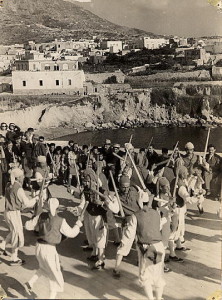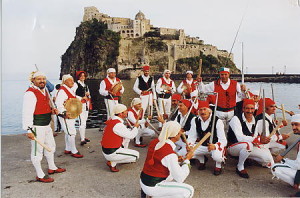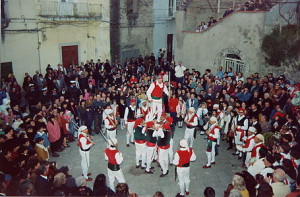The ‘Ndrezzata of Ischia Island
 This dance is performed on Easter Monday in front of the church of St. John the Baptist in rural Buonopane, to establish peace between the buonopanesi and baranesi. ‘Ndrezzata means tangle of sticks and swords, interweaving of figures, songs and sounds. The origins of this dance, also called “sword dance” can not be defined with certainty, there are so many different and different elements that compose it. Depending on the era, it has suffered, inevitably additions and amputations that year, however, does not alter the essence. One thing is certain: its origins are very ancient, indeed, very remote, whether spontaneous or derived from other civilizations such as the Greek, given the significant archaeological finds of the island of Ischia. The formation of the rose with the intertwining of the mazzarielli and
This dance is performed on Easter Monday in front of the church of St. John the Baptist in rural Buonopane, to establish peace between the buonopanesi and baranesi. ‘Ndrezzata means tangle of sticks and swords, interweaving of figures, songs and sounds. The origins of this dance, also called “sword dance” can not be defined with certainty, there are so many different and different elements that compose it. Depending on the era, it has suffered, inevitably additions and amputations that year, however, does not alter the essence. One thing is certain: its origins are very ancient, indeed, very remote, whether spontaneous or derived from other civilizations such as the Greek, given the significant archaeological finds of the island of Ischia. The formation of the rose with the intertwining of the mazzarielli and  consequent elevation of the corporal on it, the presence of females (also disengaged from the males because of violent blows that the dancers are exchanged between them) are no more than the symbol of fertility, elements that can be traced back to the primitive dance happily. The ritual takes place in three stages: the parade, the sermon and the dance itself. The main movements of the ‘Ndrezzata are: greeting, hits, blocks and dodges, the basic elements of fencing and dance same so eliminating the bloody character and adding the music and singing and replacing the mazzariello passing the sword from his right hand to the left
consequent elevation of the corporal on it, the presence of females (also disengaged from the males because of violent blows that the dancers are exchanged between them) are no more than the symbol of fertility, elements that can be traced back to the primitive dance happily. The ritual takes place in three stages: the parade, the sermon and the dance itself. The main movements of the ‘Ndrezzata are: greeting, hits, blocks and dodges, the basic elements of fencing and dance same so eliminating the bloody character and adding the music and singing and replacing the mazzariello passing the sword from his right hand to the left  is coming out of the dance itself, in which many darken the eternal battle of the sexes. The ‘Ndrezzata then you can consider an original imitation or parody of the art of dueling which was taught to youngsters Greeks. The musical accompaniment is performed by clarinets and drums, a time from pastoral flutes and whistles, and is controlled by a “corporal”. This tradition has been handed down from father to son that deals exclusively with the inhabitants of Buonopane.
is coming out of the dance itself, in which many darken the eternal battle of the sexes. The ‘Ndrezzata then you can consider an original imitation or parody of the art of dueling which was taught to youngsters Greeks. The musical accompaniment is performed by clarinets and drums, a time from pastoral flutes and whistles, and is controlled by a “corporal”. This tradition has been handed down from father to son that deals exclusively with the inhabitants of Buonopane.
Text (Neapolitan dialect):
‘Ncoppa Santu Nicola alleramente
‘a tutto ‘o munno corre tanta gente
chi cu chitarra e chi cu mandulino
vanno a vedé lu sole a la matina.
‘Ncoppa Santu Nicola è ‘na bellezza oi né
e quanno spont’ ‘o sole so’ cose ‘a stravedé.
M’aggio truvato ‘a nenna all’Epomeo
e ll’aggio chiest si vo’ fa’ ll’ammore
e m’ha risposto bella e appassiunata
ma vallo a dire a lo mio genitore.
‘Ncoppa Santu Nicola è ‘na bellezza oi né
e quanno spont’ ‘o sole so’ cose ‘a stravedé.
(recitato dal caporale) “ ‘A faccià rinto, ‘a faccià fori,
‘A faccià rinto, ‘a faccià fori, ntreccià….
“Io vengo da monte Cupo
per darvi un gran saluto.
Io vengo da Tarantiello
cu na lanza e nu spurtiello.
Noi siamo tre fratelli
tre valenti marenari:
uno si chiama Gennaro
pesca treglie e calamare
‘n auto se chiamma Vicienzo
e pesca senza licenza;
scusate signori miei
mio patre m’ha miso a nnomme Puletrone
pecché tengo sempre mmano stu bastone!
‘Na sera jevo passanno pe’ ‘stu mare
veco ‘nu cefalo ca s’appiccecava cu ‘nu calamare.
Cu la lanza lu lanzaje
cu lu cuoppo lu cuppaje
e dinto a lu vuzzo lu menaje.
Me trovo passanno pe’ Santa Lucia
tutti me diceno: -Uh che cefalo ‘ncuscienza mia!-
‘O gabbellotto rummanette ‘ncantato:
-Comme, stu cefalo accussì gruosso ‘hê piscato?-
Veco nu calabrese
da tanto luntano
cu quattro ‘rane ‘mmano
vuleva fa’ ‘a spesa:
scusate signori miei,
io cu quatto ‘rane ce pozzo passà?
Nossignore!
Me vene ‘a bile pa testa
metto ‘a mano ‘inta sacca,
caccio ‘o curtiello
e dongo ‘na botta a ‘stu cappiello.
‘O cielo m’ha aiutato.
‘o cappiello ‘nun s’è sfunnato.
…Alice!… Alice!….
‘St’uocchie tuoje so’ ddoje curnice,
si saglio ‘ncoppa mammeta che me dice?
Saglie… saglie… ca sì ‘o patrone da casa!
Io pe’ ve fà vedé ca songo ‘nu valente marenaro,
dongo ‘o divertimiento a ‘sti signuri e me ne vaco!” (fine recitato)
Trallera trallera
tirirà llirà llallera
trallera trallera
tirirà tirirà llallera
e tirà llirà llallera
trarialill’arillallà.
Tu vide comme sfila
‘stu vuzzo ‘ncoppa all’acqua
oi né che t’aggio fatto
ca nun ce vulimmo cchiù?
La lana che ne faje?
la freva te fa venire!
‘nu matarazzo ‘e stoppa
cchiù ffrisco te fa sta.
‘Ntunino ‘e Nabbulione
s’ha fatto llu ddagone
s’ha fatto llu ddaghino
‘Ntunino ‘e Giacumino.
Uno ddoje e treja
quatto cinche seje sette e otto.
Nun saccio che vurrisse
‘nu lietto de viole?
ma mò n’ è tiempo ancora
e cuntiéntate pe’ mò…
e quanno me cocco ‘a sera
m’abbraccio a ‘stu cuscino
e quanno è ‘a matina
sempe penzanno a te.
E mastu Raffaele
era nu capo fumatore
pe’ s’appiccià ‘na pippa
ce metteva cchiù de n’ora…
E llà llà llà
sempe chesto saje fa’.
Sì mastu Raffaele
e nun te ne ‘ncaricà!
Sfacciata petentosa
ca ce lo dico a mammeta
e cu ‘n’ata perna ‘e sposa
e zencariello e llariulà…
‘Sta po’ra vicchiarella
tu vide comm’è ridotta
e sotto all’aria strutta
nun pò cchiù cumparé…
Muglierema che m’è morta
era nu piezzo ‘e femmenona
teneva ‘e cosce storte
se vuleva addirizzà…
Pitidum tidum tindera
apitindum e apintindera
‘ndandà ‘ndandà ‘ndandera
‘ndandà ‘ndandà ‘ndandera
‘ndandà ‘ndandà ‘ndandera
aritreja aritré.
Annita fai de pressa
raccogli la mappata
la barca è preparata
e bisogna di partì!
‘U treia ‘u treia ‘u treia
Moglierema che m’è morta
era nu piezzo ‘e femmenona
teneva ‘e cosce storte
se vuleva addirizzà.
Purtualle lisce e musce
e lemoncielle pe’ scirià
si ‘a monaca jesce e trase
acquasanta piglia e vasa.
Figlia mia fa’ orazione
e peccata nun ne fà
si avesse nu buono vaglione
già facesse orazïone.
Figlia mia fa’ penitenza
e peccata nun ne fa.
Padre mio, so’ fiacche ‘e sense
e penitenze nun pozzo fa’.
Si t’assitte ‘o scannetiello
ce schïammo ‘o libbreciello
uva e bà, uva e bà
zi’ masto mio che t’aggia ‘a fa’?
Si veniva l’anno passato
teneva astipata ‘na scartellata
che puozz’essere scannata
jiuste pe’ ‘a tené astipata
‘U ttreja ‘u ttreja ‘u ttreja…
